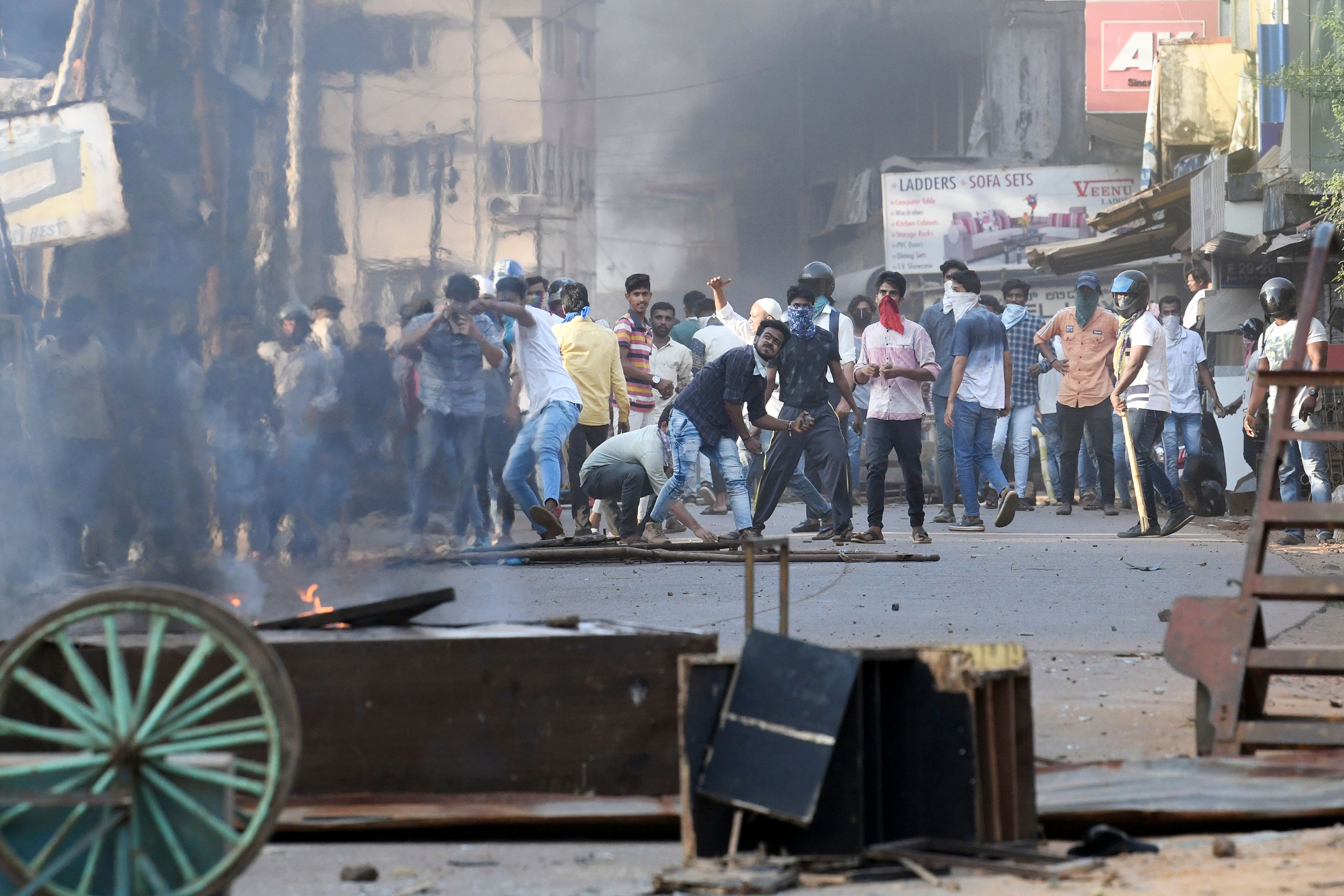India’s Modi holds security talks as protests rage over citizenship law
Sign up now: Get insights on Asia's fast-moving developments

A photo taken on Dec 19, 2019, shows protesters during demonstrations against India's new citizenship law in Mangalore.
PHOTO: AFP
NEW DELHI/MUMBAI (REUTERS, AP) - India's Prime Minister Narendra Modi met his council of ministers on Saturday (Dec 21) to discuss security to end violent protests against a controversial citizenship law, government sources said, in one of biggest crises yet for his Hindu nationalist government.
At least 17 people have been killed in violent clashes between the police and protesters since parliament last week passed the law, which critics say discriminates against Muslims and undermines the country's secular constitution. Three people were killed on Saturday.
"The PM has called a meeting of the full union council of ministers to assess the prevailing situation due to violent protests in many parts of the country against the Citizenship Amendment Act," a senior government official told Reuters, requesting anonymity.
Officials said more than 1,500 protesters have been arrested across India in the past 10 days. Additionally, some 4,000 people have been detained and then released.
The backlash against the law pushed through parliament by Modi's Hindu nationalist government marks the strongest show of dissent since he was first elected in 2014.
Protests against the new law continued on Saturday despite government's use of curfews and a draconian regulation to shut down protests.
India's Ministry of Information and Broadcasting issued an advisory Friday night asking broadcasters across the country to refrain from using content that could inflame further violence. The ministry asked for "strict compliance."
India's most populous state, Uttar Pradesh, has seen the worst violence with nine people killed so far and several more in critical conditions in hospital.
"The number of fatalities may increase," said O.P. Singh, the chief of police in Uttar Pradesh. He did not give further details on the latest deaths.
Over 600 in the state had been taken into custody since then as part of "preventive action." Police have imposed a British colonial-era law banning the assembly of more than four people in some parts of the state.
Rights activists in Uttar Pradesh said police had raided their houses and offices to prevent them from planning fresh demonstrations.
Authorities also shut schools across the state as fresh protests erupted on Saturday.
Uttar Pradesh is ruled by Modi's nationalist party and has long seen clashes between majority Hindus and minority Muslims.
In the capital city of Delhi, family members waited outside a police station seeking the release of dozens of detained protesters as police charged more than a dozen people with rioting in connection with violence during a protest Friday night in the capital's Daryaganj area.
More demonstrations took place in several parts of the country, including in the northeastern state of Assam. There, locals are angry with law as it makes it easier for non-Muslim migrants from Afghanistan, Bangladesh and Pakistan who settled in India prior to 2015 to obtain Indian citizenship.
Resentment against illegal immigrants from Bangladesh has simmered for years in Assam, one of India's poorest states, with residents blaming outsiders, Hindus or Muslims, for stealing their jobs and land.
Hundreds of women in Assam on Saturday staged a sit-in against the law in Gauhati, the state capital.
"Our peaceful protests will continue till this illegal and unconstitutional citizenship law amendment is scrapped," said Samujjal Bhattacharya, the leader of the All Assam Students Union, which organised the rally.
He rejected an offer for dialogue by Assam Chief Minister Sarbananda Sonowal, saying talks cannot take place when the "government was hoping to strike some compromise."
In other parts of India, anger with the law stems from it being seen as discriminating against Muslims, and as it makes religion a criteria for citizenship in a country that has taken pride in its secular constitution.
"This piece of legislation strikes at the heart of the Constitution, seeking to make India another country altogether,"prominent historian Ramachandra Guha wrote in an Indian newspaper, The Telegraph.
"It is thus that so many people from so many different walks of life have raised their voices against it." Guha was released from police custody after being detained for protesting against the law in the southern city of Bangalore.
Political opposition against the law has swelled with state leaders from regional parties vowing to prevent its implementation in their states.
The government has said there is no chance the law will be repealed.
However, there are those who supported the government's move and on Saturday, right-wing Hindu organisations and academicians expressed support for the law.
Over 1,000 professors and scholars congratulated the parliament and government for what they said was a progressive law standing up for forgotten minorities.
"We also note with deep anguish that an atmosphere of fear and paranoia is being created in the country through deliberate obfuscation and fear-mongering, leading to violence in several parts of the country," they said in a statement.
India is building a detention centre for some of the tens of thousands of people who the courts are expected to ultimately determine have entered illegally.
Modi's interior minister, Amit Shah, has pledged to roll out the process nationwide.


